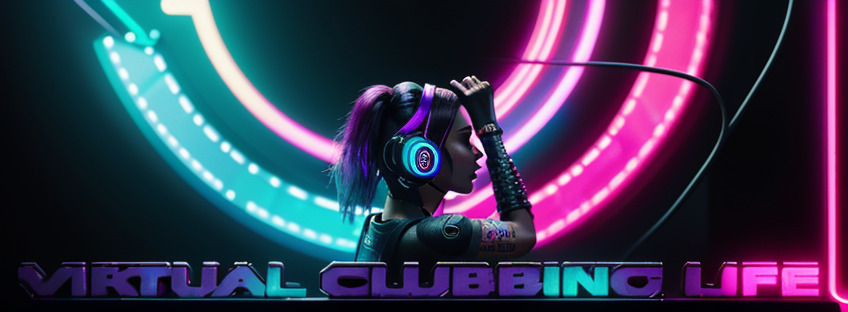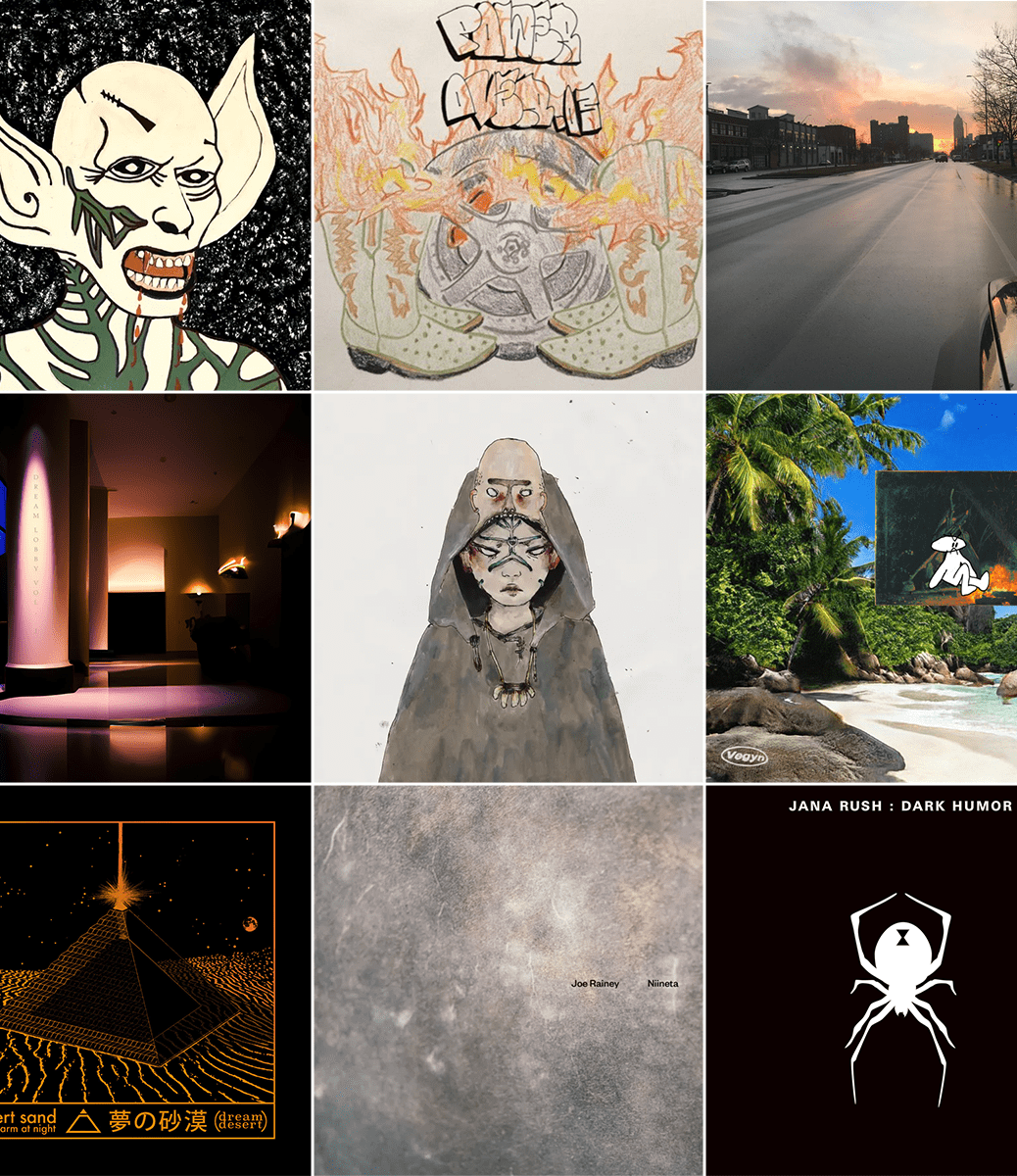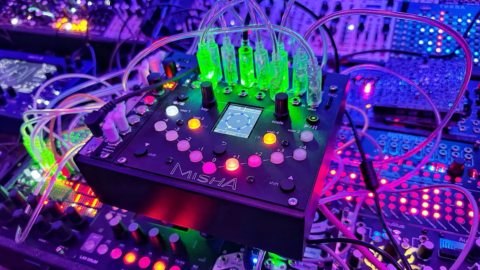
Please support our efforts to give you the best writing about the world’s best music by subscribing to Passion of the Weiss on Patreon.
Sam Ribakoff misses the days when Bandcamp didn’t cater to Fortnite streamers on Twitch.
If you’ve ever felt the burden of having to choose between whether to throw on some Brenton Wood or the Choppaholix Chopp A Cumbia mix, then Lowrider Kumbias is what you need. The concept from San Jose producer Turbo Sonidero is simple: take classic lowrider oldies you’d hear on The Art Laboe Connection (R.I.P.), chop them up on a sampler, sometimes slow them down to a chopped and screwed crawl, sometimes speed them up and rearrange them like a classic Just Blaze beat, and lay a head nodding cumbia beat over them. It’s ridiculous, but if you aren’t rocking with it by the time the AraabMuzik meets slowed cumbia remix of a Barbara Lewis track comes on, you probably wear ankle socks.
Please enable JavaScript
Please enable JavaScript
Sweaty, sexy, classic speed garage tunes and stank face inducing breakcore remixes of tracks from Bktherula, Don Toliver, and Janet Jackson (appropriately entitled “Horny Patrol”), as created by Juke Bounce Werk and Fool’s Gold’s wunderkind DJ Swisha. Made for DJs to throw in their mixes, but just as good for listening at home, or blasting out of bluetooth speakers on any form of public transportation. Share the love.
I imagine this album is what going into one of those isolation baths feels like. It’s dark, mysterious, aquatic, and all of a sudden you have a mystical experience where you see God, aliens, or psychedelic creatures. AshTreJinkins is a Low End Theory veteran who over the years has created a sound that merges beat music with techno and avant-garde sound design stuff that sounds like the undulating primordial ooze that the first Earthbound creatures walked out from eons ago.
On this album, ping-ponging percussion explodes out of subterranean bassy synth rumbles and human voices are chopped into unintelligible syllables reaching out of crumbling digital textures. It’s murky, nasty, riveting new age techno funk that you just have to seep yourself in.
Eric Douglas Porter has gone by a couple of different aliases, most notably as Afrikan Sciences, where he makes deep techno inspired by African percussion instruments and Sun Ra-style free jazz explorations. The Quoi (French for “what”) is a continuation of those explorations, with an even grittier, jazzier, sometimes even gospel feel to it, especially on the first track “Hit Me With The Cure.” The drums are thumping, the Moog synth wails are nasty, and the emotions evoked are transcendent.
Italian label Riforma is the home of what it calls New Weird Italian music, which is kind of like chopped and screwed, meets dub music, meets like 90’s IDM and chill out music. It’s kind of like if you’re a kid growing up in Italy, interested in out there electronic music, New Weird Italian music is the kind of music you’d make after being tired of wading through the drudge of the Eurovision songs, your fascist prime minister, and the corporate internet all day. This Krush Lumpkin record is the best New Weird Italian record that came out this year. It’s super spacey and ambient, with punctures of noise and Jamaican patois samples throughout that meander into almost Jlin-like footwork meets Space Afrika style dub techno, and then melt back into ambient noodling over two 45 minute tracks.
The utilitarian-titled 1002000.05 was recorded in 2005, and only released this year, but it doesn’t really matter, because everything Dak/Dakim makes sounds centuries ahead of its time. Dak, who has gone by a couple of different names throughout the years, is a later day wandering monk of the MPC, making music that combines the speaker thumping bass and smackdown snare cracks of L.A. beat music, with the grimy nocturnal soul, gritty textures, and the sense of wandering, almost psychedelic, meandering and exploration of his hometown of Detroit’s techno, house, and hip hop music histories. Filled with melting ambient synths, distorted, grainy drums that morph and grow and trip over themselves, and rough textured sound effects, this is soul searching music to meditate and bob your head to at the same damn time.
Philly’s DJ Delish took a couple of years off of releasing any new ballroom music before coming back at the beginning of this year with the hardest ballroom album of the year. Delish does all the stuff you listen to ballroom music for: the crash of those snare hits, the swagger, acerbic wit, and shade, of the vocal samples, and adds subtle textures to their tracks, like a sound effect of Toad from Mario Kart freaking out, and melodies, that make their tracks really unique and interesting. Certain pop stars who might want to use ballroom beats (cough, cough, cough) should give DJ Delish a call next time.
This year Regal86 put out three solid eps of hardcore, gritty, straight ahead rave music direct from Monterey, Mexico. Sometimes that flavor of rave music is the darkly-tinged techno and drum and bass warehouse rave vibe of Escándalo, with an excellent classic techno monotone vocals on “Smells Like U,” or Spanish rapping over NY house beats in between Yoshi samples on Loops pa’ la Discoteca, or sped up breaks and hip-hop sample-heavy techno outdoor party scene of Pro Club XL. If you’re a raver that’s never bought a ticket to one on Resident Advisor, or at least wanted to experience what that’s like, this is the music for you.
Even out in Tennessee, Jungle is still massive. On The Jungle Tape, Memphis producer Qemist makes dreamy, melodic, jungle out of a string of samples from R&B songs from the 90’s up till relatively contemporary songs. The best track on the project is the kind of Loraine James glitchy jungle meets footwork freakout of “Lonely Lover,” where a Robin Thicke song is chopped up, used for melodic fodder, and then pushed forward by a high speed, noisy, jungle break. Call it jungle shoegaze.
No doubt the best straight ahead classic house house record put out this year. AceMo has been putting out so much classic sounding house and acid techno music over the last couple of years, both solo stuff and projects with MoMA Ready as AceMoMA, that sometimes it’s hard to keep track, but they’re always good. On Wanna Play House? AceMo expands their pallett a little bit to include glittery big vocal pop-house tracks like on the title track, which you will no doubt hear blasting on a rooftop bar at a bougie hotel when summer comes back around. Enjoy it now before the graphic designer bros get to it.
No other album released this year made me gasp out loud as many times as DJ Arana’s did. There really is no way to accurately describe the music on Carreira Solo other than absolute chaos. DJ Arana is part of the broader revival of Brazilian, or baile, funk music. That’s not the American funk of Parliament and Funkadelic, but the Brazilian variant that used to mean grungy remixes of the “808 Volt” beat, but now means noisy, chaotic, minimalist musique concrete club music with Brazilian rhythms. This album goes all out on that aesthetic. At one minute there’s somber piano loops, shouting, chanting, and rapping in various languages, then the most bombastic distorted bass drums ever recorded, then moments of almost horror movie ambiance that leads into ear gratingly loud cheesy synth sounds. I promise you, you have never heard anything like this before.
Thank God the kids are making drum and bass/jungle music interesting again. Nia Archives is a part of that vanguard of young people, many of whom are people of color, who are interested in revitalizing jungle music by emphasizing both it’s Black British and Jamaican history, and adding more melodic elements from pop and R&B music into the mix. It’s just fun to hear those sped-up breakbeats wrecking havoc while someone sings, or raps, or toasts over it.
Just listen to “Part of Me,” where Nia adds her laid back, slightly smokey vocals, to a jazzy filtered horn and key line that’s quickly overtaken by a shuffling breakbeat that occasionally gives way for Nia to continue singing about heartbreak and emotional recovery. Maybe try the almost midwest emo guitar lines swirling around “Luv Like Me,” or the instant party anthem “18 and Over.” This is earworm jungle music.
At 75 songs, and a little over two and a half hours long, you don’t need to listen to all of Vegyn’s Don’t Follow Me Because I’m Lost Too!! at one time.Just put it on random and let the little gems of dreamy pop electronica float by and enjoy. Like 2019’s Text While Driving If You Want To Meet God!, this is part data dump (not just because of the length of the tracklist, but the songs are seemingly arranged not by careful consideration of narrative cohesion, but just alphabetically), and part sharing of what sounds like both a personal diary, and accounting of how much work Vegyn puts in the studio.
Most of these tracks are bite-sized morsels of pop electronica, with hazy ambience, dreamy synth melodies, and crackling percussion that owes as much to minimal techno music as it does to hip-hop. Any one of these tracks could be a hit, but nestled in this tracklist, they all add up to something even better: a really good album.
There’s no way to describe this record other than demented video game jazz electronica. The title translates to “Dark Ditch” according to Google Translate. Suzui Yūbae (what seems to be the Romanization of the artist’s Japanese name), speed runs through chords and synth runs that would make Chick Corea blush, while all sorts of cheesy digital orchestral sounds and 8-bit bloops rush by, sometimes accompanied by Suzui’s nonplussed karaoke-style singing voice, which sounds like it’s being recorded straight from their computer’s internal mic. There’s only three relatively short songs on this record, but they all feel totally unique, totally disorienting, and totally irreverent.
Over the last few years, Damar Davis has been working on a L.A. house sound, and I think this year’s Nite Roads is the project where he’s nailed the thesis statement. It’s a nocturnal jazz and soul-inspired atmosphere, bolstered by sultry keys from Detroit house music, skipping breakbeat drums from London’s old broken beat scene, minimal Detroit techno percussion, gospel-tinged melodies and samples, and fat bass sounds from G-funk and the 80’s L.A. electro scene. Add it to the walk of fame.
Devin Morrison is a R&B singer and producer whose last album, 2019’s Bussin’, is one of the best R&B albums of the decade. All chrome plated G-Funk, New Jack Swing, smooth jazz beats and synths, and tight 90’s R&B buttery vocals and gospel tinged melodies. It even had a damn Daz Dillinger feature to boot.
Since then he’s released a couple singles, and a good number of funny as hell original snippets of songs to accompany cheesy American and Japanese commercials, and put out the best Thanksgiving appropriate song of all time, “Yamz” with Masego, but not a full length project until the release this year of the six-part Dream Lobby series. Consisting of all instrumental music (although Morrison’s background cooings and “aahhs” can be heard on a couple of tracks) these are opulent, glossy, double breasted deep purple suit three sizes too big grooves, complete with orchestral hits, synth flute runs, dreamy chord changes, burbling bass, and some of the hardest hitting drums in the business. It’s Morrison’s Monster to 56 Nights mixtape run. A reintroduction. A re-anointing.
I liked Nineta – an album of original and sampled Native American powwow music filtered through electronic ambient soundscapes and noisy bassy rumbles – when it first came out, but seeing Rainey perform this music live, and just experiencing the sheer emotional weight of these tracks in person, I now love this album.
Rainey is a singer and producer from Minneapolis, a member of the Red Lake Nation of Ojibwe people who grew up singing and drumming in drum groups in Ojibwe and intertribal community events. He’s also an extensive archivist and field recorder of Native American pow wow music. Rainey uses some of those recordings of persistent, deep, group drums and powerful, full-throated individual and group singing on Niineta and adds swirls of electronic ambient synth sounds, clanging metallic percussion, spoken word vocal snippets, thumping 808 bass, and cinematic strings and piano to create a totally unique sound.
For the past couple of years Mexican and Mexican-American folk artists put out by labels like Bell Gardens-based Del Records and acts like Yahritza Y Su Esencia have been making acoustic ballads of heartbreak, emphasizing a few acoustic instruments and letting the singer’s voice and their lyrics sit starkly in the middle of the music. It’s music that’s surrounded by vast seas of empty space, perfect for somebody to add footwork drums. Using the alias Fastcar, Tuscon’s DVOID did just that on the first two tracks of this four-track EP. The other tracks are pretty competent ambient adjacent footwork tracks, but those first two tracks are some of the best and most creative footwork made this year.
A harsh noise album that’s actually pretty beautiful. Avraham. Created by Pittsburgh native Yotzeret Sheydim, this a very chaotic meditation on being trans and Jewish at a time when fascist violence abounds. Wallpaper ripping waves of synths are bathed in distortion and feedback and high pitched screaming. Synth punk drum machines and punchy bass lines hold everything together. The noise is occasionally broken through to hold a second of silence, or for Yotzeret’s pleading voice to emerge for a second, before the waves of noise envelop it again, like on the last song, and the centerpiece of the album “To Become a Man,” where Sheydim’s heavily filtered voice intones “there is nothing of value here,” before turning into a monstrous, steam spewing organ, and then into a harsh cloud of noise, which only breaks at the end when a voice starts to sing right before getting cut off by the track ending. Blast it up so your neighbors can revel in it too.
I think we’ve had enough of having to call every slight change of tempo, or drum pattern, or mood of a track, a new and distinct sub genre or scene, but I’ll make an exception for “slushwave.” Slushwave starts at the aesthetics and sample plundering of vaporwave, but whereas vaporwave tracks slow old funk and soul and Japanese City Pop down to a relatively normal tempo, slushwave slows them down to a narcoleptic crawl.
Slushwave tracks turn 30-second sample loops into 30-minute Laraaji-like meditative new age sound waves and slow motion fever dreams of late night commercials at the multicolored detritus of consumerism. British producer Desert Sand Feels Warm at Night is the leading light of this scene, and this album, which translates to “Desert of Dreams,” is Desert Sand’s magnum opus. This album moves from almost gray experimental minimalism to lush waves of technicolor sound, to slowed down torch songs straight from the Black Lodge, to music that sounds like love songs between satellites light years away from each other. Don’t let the 23 to 42 minute track lengths intimidate you: put it on in the background while you’re doom scrolling and let it hold you, if only for a little while.
If you’re a young creative kid anywhere in the world that makes music that’s loud, silly, and definitely unorthodox electronic music, then you’re posting your music to Soundcloud. This has been the case for years now, but it seems like this year there was a renaissance of outrageous and fun electronic music flooding Soundcloud, from all over the world.
In Brazil, there’s the minimalist sound barrage maximalism of Brazilian funk music, in New Jersey there’s the cacophonous clatter of experimental Jersey club music, and, of course, the further proliferation of the pop culture brain mashing sound of American digicore. All of it connected not just by Soundcloud, but a common global ethos of trying to have a laugh, some fun, and maybe even a little bit of a stimulus to dance in a time of high anxiety and constant existential dread. If you haven’t been on Soundcloud for awhile, now’s the time to head back and see what’s going on.
Exquisite. Mahogany swag. Cashmere sweaters. Brandy in a snifter glass. That’s Theo Parrish’s sultry deep house, and never more so on this silky, understated classic. Parrish has been putting out 10-plus minute trance-inducing midnight grooves for more than 25 years now, but nothing like the almost rhapsodic stuff on his most recent album, Cornbread and Cowrie Shells for Bertha. Here the (at least obvious) samples that a lot of Parrish’s best known tracks were built around are gone and replaced with what sounds like live instruments, sultry purple keyboards, deep blue basses, and dusty black drum machines, seemingly jamming and improvising, live on grooves. It’s a Detroit house jam band.
Or more accurately, I think it sounds like Parrish rehearsing, jamming in his house, working out tracks on the spot at like two in the morning on a Wednesday night, getting light and lost in the grooves until the wee small hours of the morning.
The first single put out for Jana Rush’s follow up to Painful Enlightenment is one of the best records put out last year. “Lonely” is a taut six-minute footwork jam with DJ Paypal, based around a sample of a free jazz classic. That’s the kind of shit Jana Rush is on. It’s the best footwork song of the year. Hands down. Then she ends the EP with an extended hyperactive 2Pac chop on a track titled “Make Bitches Cum.” That’s called range.
Like Painful Enlightenment, Rush loves playing with the texture of vocal samples, slowing them down for a couple of bars and milking all the digital artifacts and ambiance out of them and then speeding them up into a whirlwind of a loop, as well as almost musique concrete like samples of maniacal laughing and field recordings of industrial noises and other left field samples. That’s not to mention the hyperactive manic noises going on in “Unk,” or the tension of the pummeling cascade of percussion and sudden releases of that tension on “Don’t Want No Dick.” And what is that? Brazilian showtunes and modal jazz horn hits on “Break It (Remix)”? It’s manic music, for a manic time, with, as the title suggests, a healthy sense of realistic, pessimistic, humor about it.
DJ Travella is a 19 year old producer from Dar Es Salaam in Tanzania who makes singeli music: manic, 200-plus BPM, African rave music that takes everything from gabber to footwork to hip-hop, loads it into Fruity Loops, and comes out with a hysteria-inducing assault of sounds. Cheesy keyboard sounds are pushed to ear splitting levels in the mix, while pure whirs of percussion pummel you into spiritual acquiescence as disembodied sped up voices wail in the background, pulling you into the spiritual transfixation of the music.
Nyege Nyege Tapes, the Ugandan label that put this record out has done God’s work in documenting and releasing similarly hyperactive, ecstatic, African dance music from across the continent from people like DJ Diaki (read all about that record from 2020 right here.), a sound which mirrors a lot of the noisy, fast, and raucous music coming out of New Jersey, Brazil, and elsewhere around the world. There is a global scene of brain-glitching information overload and reckless music that DJ Travella is definitely a huge part of now.
History will absolve Burial.
Antidawn is the the first longer project from the British producer since maybe 2012’s Kindred EP, if not his most popular and well known album, Untrue, which came out in 2007. Untrue is a classic electronic music album, filled with rolling UK dubstep and garage drums, moody textural atmospheres, and extensive vocal sampling that famously turned pop R&B from Ray J into haunting cries of longing and despair.
Untrue became somewhat of the new standard bearer for the “great” electronic music album. The one that even people who don’t like electronic music can get into, since its emotional verisimilitude is easily recognizable and understandable on an unconscious level. Untrue is about despair, the crushing weight of poverty and exploitative economic and political systems on the personal and collective self, the seeming hopelessness of any meaningful change, the longing for personal connection, just wanting to feel human in an inhumane world. But people also like the album because the beats, although depressing, do indeed bang, and after waiting for years for a full length project from the dude, and finally getting it at the beginning of the year, some people felt a little deflated, or at least confused, by Antidawn’s lack of beats (there are percussion sounds in “New Love,” but they kind of just become a part of the background textural collage). Instead what people found was a brooding, wintery, 40-plus minute choose your own adventure style ambient sound collage record.
The record consists of a couple of “songs,” but they’re all a part of one long extended composition, made up of mostly what sounds like found sounds, crackling record hiss, violent winds, crickets chirping in the still night, rain drops hitting empty pavement, swaying wind chimes, accented by sweeping, almost hymnal, organs that move in and out of the album, and most prominently, haunting voices that at various times say or sing things like “take me into the night with you,” and “When the night falls In the city dark is the sky, what a night for walking, I found you there, walking nowhere”, and probably most achingly, ““Let me hold you for awhile.”
In the press notes for the album, Burial says that he was inspired by open world video games, and there is a sense of the music just throwing the listener into this strange world, and relying on them to make meaning out of it as they wish. But the vocal samples provide a sense of narrative cohesion that lifts the music into really emotional and cathartic places that I think, like Untrue, people will feel if they give Antidawn a chance. Like Untrue, Antidawn is about despair, anguish at our lives and the world as it is, longing for connection to anybody, or anything. Whereas Untrue wallows there, Antidawn finds a light, and maybe a way out.
As the last voices on the album say “somewhere in the darkest night, I wanna be there, when you’re alone, lying in your loving arms, here I am, come get me.”













